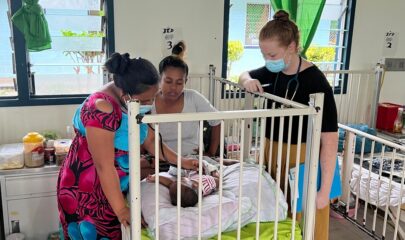“The Ebola vaccine was discovered in the early 2000s but wasn’t unavail¬able when the disease started ravaging parts of West Africa in 2015,” says Nickerson. “That’s because it had been transferred to a small U.S. firm who sat on it for years, and who at the time had no interest in developing a vaccine for a deadly but little-known disease in Africa.”
Canada plays an important global role in many areas that intersect with the humanitarian medical work of Doctors Without Borders/Médecins Sans Frontières (MSF). That in turn gives MSF many reasons to engage with Canada.
For example, the Canadian government contributes to the United Nations system through which much of the global re¬sponse to large-scale humanitarian crises is supposed to be coordinated. While MSF deliberately chooses to operate outside of this system – our independence gives us the flexibility to intervene most effectively on our own terms – we see first-hand how the communities we work with depend on it.
“By speaking directly to governments like Canada’s, we can push for a more effective global response to humanitarian crises,” says Dr. Jason Nickerson, MSF’s humanitari¬an representative to Canada.
Canada also has an advanced and inno¬vative health-sciences sector, one that has benefited from investment by various Ca¬nadian governments. Some of this publicly funded science can help prevent avoidable deaths in the places where MSF works: It was a government laboratory in Winni¬peg, for example, that first discovered the Ebola vaccine currently being used to fight outbreaks in Democratic Republic of Congo and elsewhere.
PUBLICLY FUNDED MEDICINES SHOULD BE AVAILABLE AND AFFORDABLE FOR ALL
Unfortunately, many new medicines, including those that arise from publicly funded Canadian research, fail to reach MSF’s patients, or others around the world at risk from neglected diseases and other illnesses. That’s because most new medicines and vaccines are licensed to private pharmaceutical companies who have no financial incentive to develop or sell medicines at prices that people in lower-income countries can afford.
For this reason, MSF has been calling on Canada’s government to attach con¬ditions to the support it provides for medical research and development in this country, requiring any medicines, vaccines or other health technologies de¬veloped with public funding to be made available quickly and at affordable prices, wherever they’re needed.
As part of our Lives Over Profits campaign, we sent a petition calling for these kinds of conditions, signed by more than 90,000 Canadians, to Canada’s health minister in late 2020, and are currently engaging with the Canadian government – as well as with researchers and other stakeholders – through bilateral channels to continue pushing for this change. For more informa¬tion and updates on this campaign, visit www.doctorswithoutborders.ca and search for Lives Over Profits.


